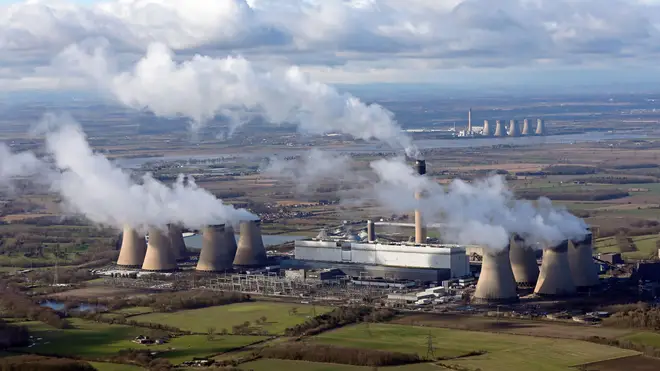
James O'Brien 10am - 1pm
26 October 2021, 16:18 | Updated: 26 October 2021, 17:16

Global plans to cut emissions still fall far short of curbing dangerous warming and are not enough to avoid "endless suffering", the UN has warned ahead of this week's COP26 summit.
A UN Environment Programme (UNEP) report said even with new and updated pledges from countries for cutting greenhouse gas emissions in the next decade, the world faces global warming of 2.7C by 2100.
Plans to tackle emissions by 2030 only reduce predicted planet-warming pollution by 7.5% by 2030 compared to previous commitments, it said.
READ MORE: What is COP26 and why does it matter? A complete guide to the key climate summit
But reductions of 55% are needed to limit global temperature rises to 1.5C - beyond which more severe impacts of climate change, from extreme weather to rising seas, will be felt.
Failing to reach this goal will lead to "a destabilised world and endless suffering, especially among those who have contributed the least to the [greenhouse gas] emissions in the atmosphere," Patricia Espinosa, executive secretary of the United Nations Framework Convention on Climate Change, said.
She added: "We are nowhere near where science says we should be."
Some 49 countries and the EU have pledged long-term targets to cut emissions to net zero, which could bring temperature rises down to 2.2C if they are fully implemented and there is action in the next decade, the report said.

What is COP26?
READ MORE: Boris Johnson says 'recycling plastic doesn't work' ahead of COP26
It also showed just a fifth of the recovery investment to help reboot economies after the pandemic had gone to supporting green measures - missing an opportunity to drive action to slash emissions.
Emissions of the gases that drive global warming are set to bounce back post-Covid, after reaching record concentrations in the atmosphere in 2020.
Launching the report before world leaders head to Glasgow for crucial COP26 climate talks, UNEP's executive director Inger Andersen warned: "The world has to wake up to the imminent peril we face as a species.
"Climate change is no longer a future problem. It is a now problem," she said.
UN secretary-general Antonio Guterres said, less than a week before the talks, "we are still on track for climate catastrophe".
Countries at COP26 are under pressure to deliver on promises made in the global Paris Agreement to hold global temperature rises to "well below" 2C and to try to keep warming to 1.5C, to avoid the worst impacts of climate change.

Green activist insists govt need to lead from front on climate
READ MORE: COP26: What could be decided at the key climate summit?
But the national plans countries previously put forward for the Paris deal left the world well off-track for the 1.5C and 2C limits, so they have had to submit new or updated plans for action up to 2030, known as nationally determined contributions (NDCs).
The latest annual analysis of the "emissions gap" between the action countries are planning and what is needed by 2030, shows even with new or updated plans from 120 countries and the EU, as well as new pledges from key polluters such as China, far more needs to be done.
It finds the impact of the new and updated plans will reduce global greenhouse gas emissions by just 2.9 billion tonnes in 2030 compared to the old NDCs, while including pledges announced by China, Japan and South Korea will reduce emissions by four billion tonnes.
Emissions need to be reduced by another 28 billion tonnes in 2030 to keep the world on a path to keeping temperature rises to 1.5C - equivalent to nearly halving current levels of pollution of just under 60 billion tonnes a year - on top of cuts already planned, the report said.
To limit temperature rises to 2C, emissions must be cut by an additional 13 billion tonnes in 2030.
The report also highlights opportunities to cut emissions quickly, including by tackling the powerful but short-lived greenhouse gas methane, which could be reduced significantly with technology and changes to diet.

Cop26 Five graphs that show the reality of climate change
READ MORE: COP26 risks becoming Covid 'super spreader event,' Scotland's health secretary admits
Capturing methane released in fossil fuel extraction, for example, could reduce emissions of the gas by around 20% a year.
And implementing all measures to curb the greenhouse gas, which comes from a range of sources including the fossil fuel industry, waste, agriculture and livestock farming, including diet changes, could reduce methane emissions by 45%.
Carbon markets, in which countries pay for emissions cuts in other places, could also cut emissions and drive ambition, the report said.
Long term net zero targets, to cut emissions to zero overall, which have been pledged by countries accounting from more than half the world's domestic greenhouse gas emissions, could make a big difference.
But current plans are in many cases vague, and do not deliver action before 2030, when it is needed, the report warns.
As the report was released, Mr Guterres urged countries to come to Glasgow with "bold, time-bound, front-loaded plans to reach net zero", eliminating emissions from every sector and providing climate finance for poor countries.